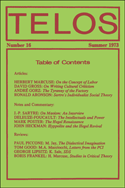As an occasional feature on TELOSscope, we highlight a past Telos article whose critical insights continue to illuminate our thinking and challenge our assumptions. Today, Frederick H. Pitts looks at Herbert Marcuse’s “On the Philosophical Foundation of the Concept of Labor in Economics” from Telos 16 (Summer 1973).
 In his 1933 essay “On the Philosophical Foundation of the Concept of Labor in Economics,” Marcuse’s thesis is that the conception of labor as economic activity gives a one-sided picture of human praxis. According to Marcuse, such a conceptualization overlooks the way in which labor is an eternal condition of human existence geared toward self-creation and becoming. Marcuse’s elucidation of these issues invites contention. As Douglas Kellner asserts in his introduction to the essay, the two principal problems with Marcuse’s position pertain to the way in which labor is, on the one hand, presented as an entirely trans- or a-historical phenomenon, capable only of being “liberated” rather than offering the possibility of being “liberated from,” and, on the other, associated with an absolutized self through the process of labor-as-becoming, holding subjectivity to be forged consciously rather than foisted upon oneself from outside (Kellner, 3–6). To these I would add a related third, which is that an economic perspective such as that challenged by Marcuse is necessary to rectify the first and second stumbling blocks. In spite of this, as we shall see, Marcuse’s theorization of the philosophical and economic conceptualization of labor might provide useful insights for a rethink of productive activity in the context of contemporary capitalism.
In his 1933 essay “On the Philosophical Foundation of the Concept of Labor in Economics,” Marcuse’s thesis is that the conception of labor as economic activity gives a one-sided picture of human praxis. According to Marcuse, such a conceptualization overlooks the way in which labor is an eternal condition of human existence geared toward self-creation and becoming. Marcuse’s elucidation of these issues invites contention. As Douglas Kellner asserts in his introduction to the essay, the two principal problems with Marcuse’s position pertain to the way in which labor is, on the one hand, presented as an entirely trans- or a-historical phenomenon, capable only of being “liberated” rather than offering the possibility of being “liberated from,” and, on the other, associated with an absolutized self through the process of labor-as-becoming, holding subjectivity to be forged consciously rather than foisted upon oneself from outside (Kellner, 3–6). To these I would add a related third, which is that an economic perspective such as that challenged by Marcuse is necessary to rectify the first and second stumbling blocks. In spite of this, as we shall see, Marcuse’s theorization of the philosophical and economic conceptualization of labor might provide useful insights for a rethink of productive activity in the context of contemporary capitalism.







